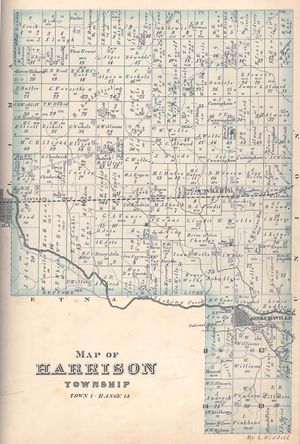Harrison Township
The presence of Native American mounds in Harrison Township has largely been destroyed through intensive agriculture. At the time of European settlement, the township was heavily wooded with some area of swamp. The clearance of the forests and intensive agriculture began with the first wave of white settlers in 1805-1806. The original formation of Harrison Township in 1816 did not include the southern strip of land that bordered Fairfield County. This area, originally included in Etna Township and part of the Refugee tracts, added a section of the National Road and Kirkersville to Harrison Township. [1] Harrison Township experienced some early population growth, but a significant portion of the area remained undeveloped for decades. Local chroniclers credited this underdevelopment to the absentee ownership of large tracts of land in the township. Such a juxtaposition of thick forest and scattered settlement may have led to an early notable event in the area - a wolf hunt held in 1823. [2] Much of the early growth is accredited to the National Road. In fact, the largest settlement in the township, Kirkersville, owes its origins to the road. the only other settlement, Kirkersville Station or Outville, grew as a way to reconcile the path of the National Road with railways added decades later.
Outville
The village of Outville in Harrison Township began as the rail depot station for neighboring Kirkersville, called Kirkersville Station. A few stores and businesses located there to cater to the traffic from the depot to the larger village, and a few permanent residents followed. The name of the settlement was changed to Outville in the 1850s by James Outcalt in order to avoid confusing Kirkersville Station with Kirkersville. [3] A post office—called the Outville P.O. was added in 1858, and this would remain in operation until 1960. [4] Outville remains a unique community with a unique name, and a quirky history to go with it.
Kirkersville
The village of Kirkersville was platted in 1832, conforming with the dates of the other villages that appeared in Licking County along the National Road as it moved west. Kirkersville's founder and namesake was Dr. William Kirker, a local landowner. The first business in the village was a tavern owned by Thomas Youmans, an appropriate first business for a town that served travelers on the National Road. [5] Kirkersville enjoyed rapid early growth thanks to the Road, expanding to more than three hundred people. In 188, with a population of 349, Kirkersville was the sixth largest town in Licking County.
The population of the village and township have grown in recent decades; from a population of 1,328 in 1880, the township of Harrison grew to 7,561 by the 2010 census. [6]
The Wolf Hunt
Though referred to by chronicler N.N. Hill as the "famous wolf hunt," the account of the wolf hunt that took place in Harrison Township in 1823 has found little fame in subsequent histories. Frustrated by the depletion of livestock herds by wolves, a hunt of local wolves was called in the township. A large number of Licking County residents turned out for the hunt with some on foot and others on horseback calling on trumpets. Despite the premise of ending the predations of local wolves, the account of the hunt in Hill's volume reads like an unbridled slaughter of local wildlife; trees were set on fire and far more deer (forty-nine) and turkeys (sixty-seventy), and even a solitary bear and an unlucky owl were killed alongside just three wolves. Even Hill admitted that such a hunt was done less out of necessity than for the "fun of the thing."[7]
For more information see also:
Harrison Township's Official Website https://harrisontownship.net/
Schaff, Morris. Etna and Kirkersville. Boston and New York: Houghton, Mifflin and Company, 1905.
J.G.
Return to Townships and Communities main page.
References
- ↑ Hill, N., History of Licking County, 471-472
- ↑ Hill, N. History of Licking County, 472
- ↑ https://harrisontownship.net/
- ↑ Ohio Ghost Towns: No 44 Licking County, ed. Helwig and Helwig, (1998), 108
- ↑ Brister, E., Centennial History, 293
- ↑ Hill, N. History of Licking County, 263
- ↑ Hill, N. History of Licking County, 473-475
